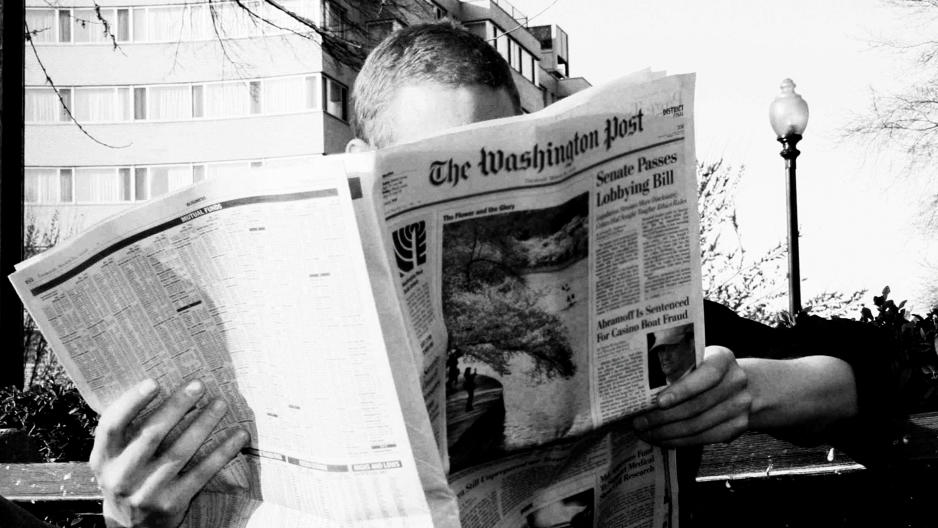Here’s What Happened When I Gave Up Following The News For A Week
Raise your hand if you are sick of all the election coverage. Or constantly hearing about potential terror threats, the latest e.coli outbreak at that chain restaurant, or even Kim Kardashian. Chances are, your hand is up. Yet if you’re anything like me, you’re probably still a bit of a news junkie.
As a journalist, news gathering is an inescapable part of my job. But those outside of the news business who follow the news almost as much as I do may put this down to “staying informed.” Some may even see it as a civic duty to know what’s going on in their local area, or on a national or global level. For others, constantly checking the news may be just another way to fill up our ever-shortening attention spans with another quick hit of stimulation.
No matter what your reasons for being a news junkie, researchers are finding that consuming news on an hourly or even daily basis is bad for your brain. Studies have shown that an overabundance of news can make you depressed, anxious, and, for the most part, doesn’t usually provide you with the ability to actually change or influence anything being reported.
On the flip side, there’s evidence that giving up constantly following the news could make you happier and healthier. And that’s exactly what I wanted to see if I could prove. Would giving up following the news make a difference in my life?
So for one week I completely avoided news of any kind: no websites, social media, television talking heads, or even newspapers. Here’s what happened.
I Felt Less Anxious And Pessimistic, Then Happier And Safer
During the first 48 hours of giving up the news, my anxiety increased because I felt like I was “missing out” on what was going on in the world for every minute that was going by. But by midweek I found I didn’t miss “being informed” and my anxiousness subsided. By the end of the week I noticed my daily mood was actually more positive, and I was generally happier than I normally am.
“Your brain creates mental models or assumptions about the world based on the information you take in,” explains Pamela B. Rutledge, PhD, director of the Media Psychology Research Center and faculty in media psychology at Fielding Graduate University. “Thus when you are inundated with news, it triggers an instinctive survival response.” And because of the “if it bleeds, it leads” mentality ingrained in the media, most news is negative, depressing, or fear inducing (fear of terrorism, fear of loss, fear of others), which inaccurately colors how we view the world as a whole.
There’s actually a phrase for this. “Mean World Syndrome describes the phenomenon where you feel your immediate world is much more dangerous than it actually is because of the input you have received,” says Rutledge. Indeed, by the end of the week, due to my lack of negative news input, I actually felt safer, or less worried about potentially harmful incidents, such as a terrorist attack (something the media always keeps at the forefront of people’s minds—especially those who live in a big city like me).
I Didn’t Suffer Any Kind Of Competitive Disadvantage
A frequent reason news junkies will give for constantly following every latest development is that they feel it gives them a competitive edge in life. Short of a news alert announcing the impending arrival of a storm or some other potential disaster, constantly monitoring the news usually doesn’t give you any real-world advantage.
Despite giving up the news for a week, I didn’t experience any kind of personal disadvantages compared to my neighbors or family who continued to follow the news. They didn’t surpass me in wealth, happiness, or opportunities.
When I mention this to Rutledge, she agrees with my assessment, at least over the short term. But she notes that completely swearing off the news for the rest of your days could affect other things in your life that you may not think it would.
“Stepping away from the news would not necessarily detract from your social capital in many groups—certainly not in a week,” says Rutledge. But, she continues:
If, however, you were very interested in politics, policy, social issues, social advocacy, economic growth, individual rights, education, sports, or a zillion other topics where the news reflects what’s happening there, you might, over time, find that your group of friends would shift to include less of those who care about those things and more of those who care about things where the news isn’t central, i.e. bike riding, cooking, or woodworking.
I Felt More Creative And Focused
Perhaps the most surprising impact my news blackout had on me was that I actually felt more creative and focused by the end of the week. As a journalist and novelist, I need to constantly come up with story ideas, and the news is a goldmine. But by the end of the week, it was as if not constantly stuffing my mind with passive news stories and quick-hit tidbits and breaking news alerts allowed my brain to find its true imagination again.
Rutledge says this increased creativity is actually related to stepping away from the mostly negative stories the news reports:
When we are afraid or depressed, it constrains our cognitions. Our bodies marshal resources to protect us and prepare us for fight or flight–-even if it’s just in response to news stories we hear on the TV. Thus stepping away from negative thinking [and news] would improve mood and by extension enhance creativity and open-mindedness–-a necessary precursor of creativity.
An added benefit to my increased creativity: I had more time to explore my thoughts and ideas because I wasn’t wasting so much of it on following the news.
I Learned That Being Informed And Being A News Junkie Are Not The Same Thing
Perhaps the most important takeaway from my news blackout is that “being informed” and being a “news junkie” are not the same thing. This is something that Rutledge stresses is an important distinction to make in our world of media overload.
Rutledge says the inherent problems to news consumption are twofold. The first involves how you curate the news you choose to take in, how much you focus on a specific type of news, and how much time you devote to it. The second is that it’s important to understand that there is a lot of conflict in the world, whether it’s the fear-based political fighting over the U.S. presidential campaign or the U.K.’s Brexit. Constantly choosing to read and focus on those fears is emotional engagement, not cognitive engagement. For most people, following the news is done on an emotional engagement level, not on a cognitive engagement one.
“What you have learned is the power of mindlessness versus mindfulness,” says Rutledge. “Intentionality is key to the positive consumption of information. Intentionality allows you to frame the news so that it doesn’t amorphously change your life and leak into your thoughts unbidden.”
Mindful consumption of news means that we learn how to maintain an awareness of what and how much we are choosing to consume—not just intellectually, but somatically, Rutledge notes. Through increased awareness we can learn to feel in our bodies when the news is too much.
In order to maintain a healthy relationship to the news, Rutledge says it’s a good idea to take some time to step away from it every once in a while. “It’s important to leave mental ‘spaces’ instead of filling up every minute of your thoughts with news,” says Rutledge. “I always think of management guru Peter Drucker who said that every year you have to quit doing about 25% of your job so you can figure out what new stuff needs doing. It’s like that with news, too.”
related video: Yael Cohen On Tuning Out Distractions
Fast Company , Read Full Story
(24)














